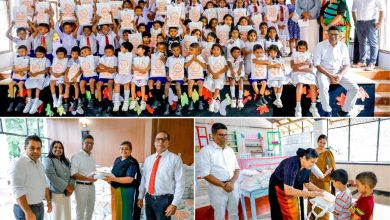LMDtv 4
 Unprecedented disruption, changes and uncertainty govern today’s world. However, the former chairman of the Sri Lanka Export Development Board (EDB) Suresh de Mel is optimistic in spite of the volatility.
Unprecedented disruption, changes and uncertainty govern today’s world. However, the former chairman of the Sri Lanka Export Development Board (EDB) Suresh de Mel is optimistic in spite of the volatility.
He believes that times like these offer opportunities for those who think innovatively.
In a recent LMDtv interview, he highlighted how businesspeople – including entrepreneurs in the export sector – have an assortment of tools at their disposal such as the availability of information.
He noted: “Given all these developments with AI, we will know what has happened and what’s going to happen in the next two or even five years, and we can analyse the data efficiently.”
Improvements in connectivity with overseas buyers and suppliers via platforms such as Zoom have made it easier for exporters to stay in touch and communicate better with their stakeholders.
“I look at disruption as an opportunity for change; and I think the whole world is ready to change,” he added.
Shedding light on regional developments that Sri Lankan exporters should consider, he pointed to the potential in the Indian source market.
De Mel explained that “India is the closest country to us and has one of the largest expanding middle-class segments. If we can manage the Indian market, then we can manage all the other regional markets. India offers vast opportunities – from the richest to the poorest market segments.”
In addition, he explained that since Sri Lanka is a small nation, instead of feeling threatened by Indian products entering the country, local exporters should focus on exporting their products to India.
De Mel elaborated: “The Indian market is huge so the best approach is to identify niche market segments and cater to them. Since there are differences when you compare India with the Maldives or Bhutan, exporters need to recognise those differences and not adopt a ‘one-size-fits-all’ approach.”
“We must understand market differences and cater to them accordingly – because we can’t sell everything to everybody,” he maintained.
He also highlighted the importance of moving beyond traditional commodities in their generic form towards more value added products.
And as de Mel explained on the weekly digital TV programme hosted by Ruwandi Perera, Sri Lanka “has the world’s best cinnamon, best rubber and best gemstones, but other countries are adding value to these items and earning more than us.”
Regarding the importance of information driven decision making, he asserted: “Sri Lanka’s SMEs shouldn’t feel intimidated about not having information. Many people say they don’t have the necessary information and come to the Export Development Board without checking its website, which contains plenty of information.”
He continued: “And if what’s required isn’t there [on the EDB website], the staff are qualified to search via desk research since they’re in contact with embassies around the world.”
It goes without saying that being up-to-date on global trends is also key to achieving success. To this end, he asserted that “in today’s world, one year is a long time and things that didn’t change over a decade previously are now changing within a month.”
Along with entrepreneurial effort, another key driver of export growth in Sri Lanka is increased collaboration between government agencies and the private sector.
On this score, de Mel explained that “there needs to be a lot more space for private sector participation because the government is not an entrepreneurial entity. So it needs to understand the private sector’s attitudes and needs, such as being sustainable and profitable. However, in the future it will be the responsibility of the private sector to help the government adjust its thinking.”
Boosting exports is a critical economic goal for Sri Lanka in the coming years, and de Mel opined that exporters need to understand that they can’t and don’t need to export everything to everybody.


